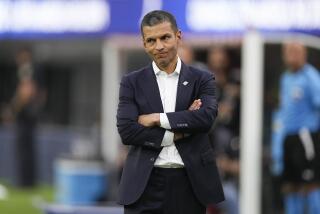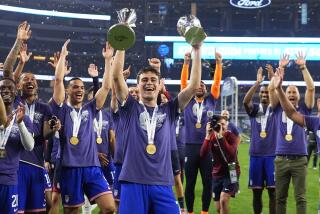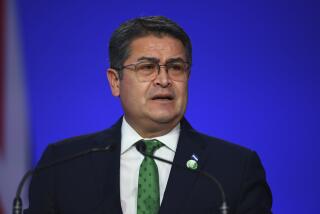A divided Honduras unites for World Cup
Soccer saved Honduras.
That’s not an opinion, it’s a fact, insists Danilo Turcios, a veteran midfielder on a Honduran team that returns to the World Cup for the first time in 28 years.
“Soccer,” he says, “was the only thing that united the country after all the political problems had divided it.”
Last summer, with Honduras once again struggling to stay alive in its World Cup qualifying tournament, the country was rocked by a coup. Army forces stormed the national palace and seized President Manuel Zelaya, forcing him into exile and installing congressional leader Roberto Micheletti.
Riots broke out, the turmoil turning husband against wife, brother against sister. And as the tensions increased, a peaceful resolution seemed unlikely.
But then Honduras won its next World Cup qualifier. And the one after that, scoring eight times in the two games. Suddenly people were talking about something other than politics.
“It got rid of the problems with the presidency,” says Marithza Portillo, a waitress and Honduran immigrant who works in Hollywood. “There were two countries, but with soccer there was just one. It happened at the right time.”
And when Honduras won its final match, earning a berth in the World Cup final for just the second time in history, the streets filled again. Only this time the people were celebrating.
“The people have been liberated behind soccer,” says Reinaldo Rueda, the team’s Colombian-born coach. “It allowed brothers that have been separated to embrace, married couples who had been in conflict – the wife with Micheletti, the husband with Zelaya – to reconcile.
Honduras’ stay in South Africa figures to be a short one. Los Catrachos, who have never won a World Cup match, are in a tough group, paired with Chile, Spain and Switzerland in the first round.
And the team’s tournament preparations have not been smooth. Three months ago Rueda hinted he might leave after the country’s ruling federation failed to pay the team a $1.3-million bonus for reaching the World Cup. Then four days before the coach was to name his World Cup roster, striker Carlos Costly, the second-leading scorer in qualifying, fractured a bone in his right foot.
Even the weather has been a problem. Three weeks before its World Cup opener, the team had to find a new training base in the Austrian Alps after severe rains left the fields unplayable.
Yet that’s done little to dampen the fervor of the country’s long-suffering fans. At Antojitos Bibi, a Honduran restaurant that faces MacArthur Park in the middle of Los Angeles’ largest Central American community, the doors will open well before sunrise on June 16, when Honduras plays its first game against Chile.
“Hondurans feel very emotional about football,” says owner Mario Ponce, who sells everything from national team soccer jerseys to coffee mugs from his restaurant.
The place was packed last fall on the night Honduras qualified for the World Cup, he said. The team needed to beat El Salvador, which it did, but it also needed the U.S. to beat or tie Costa Rica – and that looked unlikely with Costa Rica guarding a 2-1 lead and enjoying a man advantage with just 20 seconds left in stoppage time.
But then U.S. defender Jonathan Bornstein headed in a corner kick, sending Honduras to South Africa. “Everybody was crying,” Ponce’s son Walter remembers.
Back in Honduras, photographers caught former President Zelaya, then living in the Brazilian Embassy, celebrating while Micheletti, the man who replaced him, declared a national holiday and offered Bornstein a free vacation.
Zelaya has since left Honduras for exile in the Dominican Republic while Micheletti has been replaced as president by Porfirio Lobo, sworn in in January in the same stadium where the Honduran national team made the peaceful transition of power possible.
At least that’s how the players see it.
“All of us, we give thanks every day to God for this blessing to play soccer,” says team captain Amada Guevara. “And the blessing that, through us, we could unite our people.”







